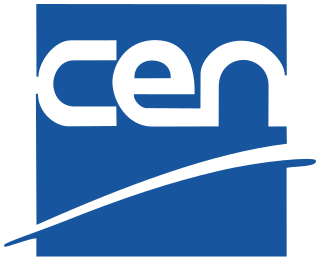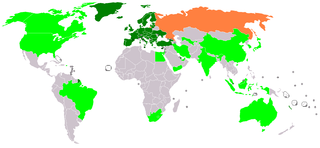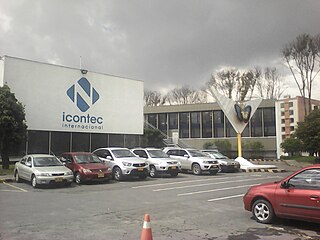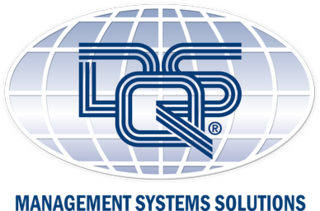
The American National Standards Institute is a private non-profit organization that oversees the development of voluntary consensus standards for products, services, processes, systems, and personnel in the United States. The organization also coordinates U.S. standards with international standards so that American products can be used worldwide.

The International Organization for Standardization is an international standard-setting body composed of representatives from various national standards organizations.
The ISO 9000 family of quality management systems (QMS) is a set of standards that helps organizations ensure they meet customer and other stakeholder needs within statutory and regulatory requirements related to a product or service. ISO 9000 deals with the fundamentals of QMS, including the seven quality management principles that underlie the family of standards. ISO 9001 deals with the requirements that organizations wishing to meet the standard must fulfill.
ISO 14000 is a family of standards related to environmental management that exists to help organizations (a) minimize how their operations negatively affect the environment ; (b) comply with applicable laws, regulations, and other environmentally oriented requirements; and (c) continually improve in the above.

The European Committee for Standardization is a public standards organization whose mission is to foster the economy of the European Single Market and the wider European continent in global trading, the welfare of European citizens and the environment by providing an efficient infrastructure to interested parties for the development, maintenance and distribution of coherent sets of standards and specifications.
Quality management ensures that an organization, product or service is consistent. It has four main components: quality planning, quality assurance, quality control and quality improvement. Quality management is focused not only on product and service quality, but also on the means to achieve it. Quality management, therefore, uses quality assurance and control of processes as well as products to achieve more consistent quality. What a customer wants and is willing to pay for it determines quality. It is a written or unwritten commitment to a known or unknown consumer in the market. Thus, quality can be defined as fitness for intended use or, in other words, how well the product performs its intended function.
The VDE e. V. is one of Europe’s largest technical-scientific associations with 36,000 members, including 1,300 corporate and institutional members and 8,000 students.
GOST refers to a set of technical standards maintained by the Euro-Asian Council for Standardization, Metrology and Certification (EASC), a regional standards organization operating under the auspices of the Commonwealth of Independent States (CIS).
The Standards Council of Canada (SCC) is a federal Crown corporation with the mandate to promote voluntary standardization in Canada, where standardization is not expressly provided for by law, however certification to some standards could be required through regulation. Located in Ottawa, Ontario, SCC has a governing council of as many as 13 members and a staff of approximately 110. The organization reports to Parliament through the Minister of Industry.
The Spanish Association for Standardization and Certification (AENOR) is an entity dedicated to the development of standardization and certification in all Spanish industrial and service sectors.

The British Standards Institution (BSI) is the national standards body of the United Kingdom. BSI produces technical standards on a wide range of products and services and also supplies certification and standards-related services to businesses.
An independent test organization is an organization, person, or company that tests products, materials, software, etc. according to agreed requirements. The test organization can be affiliated with the government or universities or can be an independent testing laboratory. They are independent because they are not affiliated with the producer nor the user of the item being tested: no commercial bias is present. These "contract testing" facilities are sometimes called "third party" testing or evaluation facilities.
Customer retention refers to the ability of a company or product to retain its customers over some specified period. High customer retention means customers of the product or business tend to return to, continue to buy or in some other way not defect to another product or business, or to non-use entirely. Selling organizations generally attempt to reduce customer defections. Customer retention starts with the first contact an organization has with a customer and continues throughout the entire lifetime of a relationship and successful retention efforts take this entire lifecycle into account. A company's ability to attract and retain new customers is related not only to its product or services, but also to the way it services its existing customers, the value the customers actually perceive as a result of utilizing the solutions, and the reputation it creates within and across the marketplace.

The South African Bureau of Standards (SABS) is a South African statutory body that was established in terms of the Standards Act, 1945 and continues to operate in terms of the latest edition of the Standards Act, 2008 as the national institution for the promotion and maintenance of standardisation and quality in connection with commodities and the rendering of services.

ETSI is an independent, not-for-profit, standardization organization in the field of information and communications. ETSI supports the development and testing of global technical standards for ICT-enabled systems, applications and services.

The Bureau of Indian Standards (BIS) is the national Standards Body of India working under the aegis of Ministry of Consumer Affairs, Food & Public Distribution, Government of India. It is established by the Bureau of Indian Standards Act, 1986 which came into effect on 23 December 1986. The Minister in charge of the Ministry or Department having administrative control of the BIS is the ex-officio President of the BIS.

The Colombian Institute of Technical Standards and Certification is a non-profit private organization in Colombia that oversees the compliance of national and international standards. It is an open organization with members from the Colombian government, private sector and any individuals interested in the compliance of standards in Colombia. Icontec works closely with other international organizations for standardization such as ANSI and DIN. Icontec accredits organizations, companies and individuals that engage in the manufacturing or development of products and industrial processes. Icontec is a member of the International Organization for Standardization ISO and is an active partner in regional standards organizations such as COPANT and IEC. Icontec is present in different countries of the Americas and the Caribbean. Its headquarters are in Bogota, Colombia.

DQS Holding GmbH based in Frankfurt am Main is the holding company of the worldwide DQS Group. The group provides assessments and certifications of management systems and processes of any type.
EN 16114 "Management consultancy services" is a standard published by the European Committee for Standardization (CEN) on September 28, 2011. It focuses on the providing of management consulting services by management consultancy service providers (MCSPs).

The Turkish Standards Institution is a public standards organization whose mission is to increase the competitiveness of Turkey, facilitating trade on national and international levels and develop society's standard of living by providing standardization and conformity assessment in diverse fields.








